| Srl | Item |
| 1 |
ID:
139123
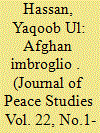

|
|
|
| 2 |
ID:
172481
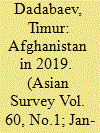

|
|
|
|
|
| Summary/Abstract |
Afghanistan in 2019 was marked by advances and setbacks with respect to stabilizing the country and reshaping its relations with international partners. The year brought new presidential elections and signs of potential political dialogue, as well as hopes for expanded economic ties with neighbors. But there are still uncertainties about the prospects of US withdrawal and the country’s future.
|
|
|
|
|
|
|
|
|
|
|
|
|
|
|
|
| 3 |
ID:
138391
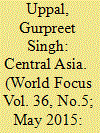

|
|
|
|
|
| Summary/Abstract |
The current developments in Afghanistan and the proposed western military pullout in near future raise serious questions on the stability of the region as a whole. No amount of prodding the private sector to participate in India-CAR trade can be possible unless the connectivity issue is resolved. Whether India transcends its risk aversion remains to be seen. However India can play a positive role in the Central Asian environment where regional states are hard put to maintain balances between other major players.
|
|
|
|
|
|
|
|
|
|
|
|
|
|
|
|
| 4 |
ID:
143350
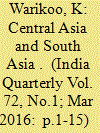

|
|
|
|
|
| Summary/Abstract |
India and Central Asia have shared a geo-cultural affinity and a long tradition of historical contacts that dates back to antiquity. There is convergence of views and interests between the Central Asian Republics and India, on fundamental issues such as; (a) need to maintain social harmony and equilibrium by promoting inter-ethnic harmony and peaceful co-existence; (b) commitment to secularism and democracy and opposition to religious fundamentalism; (c) recognition of threat to regional security and stability from trans-border terrorism, arms and drug trafficking, religious extremism and ethnic-religious secessionism; (d) commitment to the principles of territorial integrity of nation states and inviolability of state borders; (e) promoting economic, scientific and cultural cooperation and (f) ensuring peaceful and tranquil neighbourhood in Afghanistan.
The Central Asian Republics, being cautious and wary of dominating influence of the powerful neighbours like Russia and China look towards India as a friend and partner, which does not have any political or territorial ambitions in the region. India is also expected to play a balancing role in the big power games in Central Asia.
|
|
|
|
|
|
|
|
|
|
|
|
|
|
|
|
| 5 |
ID:
138399
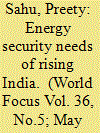

|
|
|
|
|
| Summary/Abstract |
Energy is an important input for any economy, especially for a rapidly rising economy like India. A large portion of Indian masses use bio-mass and fossil fuel as energy resources. However India’s demand for commercial energy is quite high while availability is low.
|
|
|
|
|
|
|
|
|
|
|
|
|
|
|
|
| 6 |
ID:
147216
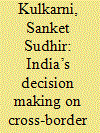

|
|
|
|
|
| Summary/Abstract |
In the last two decades, cross-border gas pipelines have become an integral part of discourse on India’s energy security. Successive reports from the government and the private sector have envisaged an important role for cross-border gas pipeline projects in India. After engaging in negotiations for several years, the Indian Government finally joined the Turkmenistan, Afghanistan, Pakistan and India (TAPI) gas pipeline over the Iran–Pakistan–India pipeline (IPI) and the Myanmar–Bangladesh–India pipeline (MBI). Several critics of this project have questioned this decision of the Indian Government to join TAPI due to the huge levels of risks involved and the project’s commercial unviability. The article is an attempt to understand the decision-making process of the Indian Government on cross-border gas pipeline projects and its rationale for choosing a seemingly riskier project like the TAPI pipeline and letting go of the other two pipeline projects. The article makes an attempt to conduct a detailed discussion around such factors that contributed to India’s decision making on these projects.
|
|
|
|
|
|
|
|
|
|
|
|
|
|
|
|
| 7 |
ID:
138389
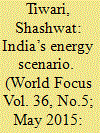

|
|
|
|
|
| Summary/Abstract |
Energy security shall remain an inter-play of demand and supply scenarios, which in themselves are influenced by a number of factors which need careful evaluation and consideration over the long-term. India has presence of dynamic private sector and a burgeoning middle class, however it faces growing challenges to maintain its economic growth. In the first quarter of 2012, the Indian economy grew by 5.3 per cent, which is the lowest in the past ten years. With increase in trade and budget deficits, there are challenges associated with a depreciating currency. To continue with the economic growth an accelerated transition to an energy sector based on market economy is the call of the hour.
|
|
|
|
|
|
|
|
|
|
|
|
|
|
|
|
| 8 |
ID:
138397


|
|
|
|
|
| Summary/Abstract |
To conclude India and Central Asia continues strategic neighborhood and they are natural allies regarding the utilization of natural resources. Both of the region are geographically proximate, share common interests. As far as energy sector is concerned India needs to become a significant player in the equitable exploitation and distribution of the Central Asian energy resources.
|
|
|
|
|
|
|
|
|
|
|
|
|
|
|
|
| 9 |
ID:
135481
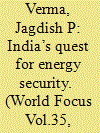

|
|
|
|
|
| Summary/Abstract |
In twenty-first century, global realities have altered the concept of national security. While national security is a holistic concept, energy security is one of its major components. The latter essentially involves ensuring uninterrupted supply of energy to support the economic and commercial activities necessary for sustained economic growth. As far as India is concerned, energy security emanates from the growing imbalance between the demand for energy and its supply from indigenous sources resulting in increased import dependence.
|
|
|
|
|
|
|
|
|
|
|
|
|
|
|
|
| 10 |
ID:
123373
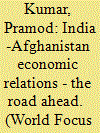

|
|
|
|
|
| Publication |
2013.
|
| Summary/Abstract |
India-Afghanistan jointly presents a great potential of trade relationship but seeing the turbulent nature of Afghanistan's political situation, it is extremely difficult to anticipate the future of it. Historically, India's presence in Afghanistan has been extremely strong in many fields such as cultural, economic and political in the past but for last few decades, fluctuations in the relationship of any kind has been hanging in balance and dependent upon the external forces operating there to establish their control for a grip on the eco-political activities.
|
|
|
|
|
|
|
|
|
|
|
|
|
|
|
|
| 11 |
ID:
119291
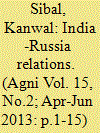

|
|
|
| 12 |
ID:
125318
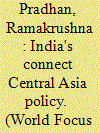

|
|
|
|
|
| Publication |
2013.
|
| Summary/Abstract |
As far as energy sector is concerned, India needs to become a significant player in the equitable exploitation, administration and distribution of the Central Asian energy resources. India must look forward to restart working on TAPI and IPI pipeline projects as they constitute India's energy lifeline. This just wouldn't help India in ensuring her much needed energy security but also enable her in strengthening regional security, peace and cooperation in the region. India must also seek to explore alternative oil and gas transit route along with the existing pipelines. To improve connectivity, India will have to play a pro-active role both bilaterally and through regional cooperative mechanisms.
|
|
|
|
|
|
|
|
|
|
|
|
|
|
|
|
| 13 |
ID:
118101


|
|
|
| 14 |
ID:
112522
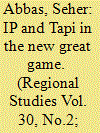

|
|
|
| 15 |
ID:
138385
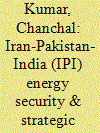

|
|
|
|
|
| Summary/Abstract |
The important lessons learnt from the trilateral negotiations on the IPI pipeline reflect variance in legal, institutional, economic and trade laws and practices prevalent in the three countries. The project highlights the complexities of cross border pipeline projects, ranging from a macro view in which geopolitical forces play a role to a micro view where cross-border technicalities and regulatory issue play a role and, ultimately, how these complexities influence the choices made by the parties involved. The IPI gas pipeline has thus suffered delays common to most other cross border pipelines.
|
|
|
|
|
|
|
|
|
|
|
|
|
|
|
|
| 16 |
ID:
125706


|
|
|
|
|
| Publication |
2013.
|
| Summary/Abstract |
India's energy situation is characterized by increasing energy demand, high fossil fuel dependency, large import shares, and significant portion of population deprived of modern energy services. At this juncture, natural gas, being the cleanest fossil fuel with high efficiency and cost effectiveness, is expected to play an important role. India, with only 0.6% of proven world reserves, is not endowed with adequate natural gas domestically. Nevertheless, there are gas reserves in neighbouring regions which gives rise to the prospects of three cross border gas pipeline projects, namely, Iran-Pakistan-India, Turkmenistan-Afghanistan-Pakistan-India, and Myanmar-Bangladesh-India. This study is a political analysis of these pipeline projects. First, it provides justification on use of natural gas and promotion of cross border energy trade. Then it examines these three pipeline projects and analyses the security concerns, role of different actors, their positions, shifting goals, and strategies. The study develops scenarios on the basis of changing circumstances and discusses some of the pertinent issues like technology options for underground/underwater pipelines and role of private players. It also explores impact of India's broader foreign relations and role of SAARC on the future of pipelines and proposes energy induced mutually assured protection (MAP) as a concept for regional security.
|
|
|
|
|
|
|
|
|
|
|
|
|
|
|
|